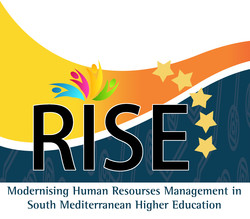Modernising Human Resources Management in South Mediterranean Higher Education (RISE)

The importance of quality human resource management (HRM) for the development and optimisation of Higher Education Institutions (HEIs) is undeniable today. There are increasingly complex academic scenarios which demand HRM models able to respond to new challenges in the selection, development and motivation of staff. HR approches focused on tasks-performanc related to personnel recruitment, organisation of employment contracts and payment of wages are compeltely superseeded by new issues, such as training, promotion and encouragement, evaluation, development support and systematic planning for future needs.
National
and regional processes of socio-economic transformation and
globalisation are influencing HRM in HE worldwide. In South
Mediterranean countries, HR systems face numerous challenges focused in
different factors, such as quality, level of state expenditure in
education, suitability to the real needs of labour market and society,
appropriate governance mechanism, and acces to HE, particular for most
vulnerable groups.
Reforms in the South Mediterranean
countries are seriously needed to move forward and try to take advantage
of the socio-political movements of past years, the results of which
are still quite uncertain. To do so, HEIs need to overcome certain
difficulties such as common staff shortages and improvable working
conditions, which have direkt impact on the motivation of their
personnel. Management structures need also to apply more transparent
recruitment criteria and processes, less politically oriented merits,
good contractual conditions and balanced and transparent options for
promotion.
As regards the countries targeted by RISE (Jordan,
Tunesia, Algerie and Morocco) they all share the abovementioned
diffculties. There is, i.a., a generalised lack of structure trainig
programmes for staff, little use of e-governance tools to simplify
procedures, and a weak culture on meritocracy, as highlighted, e.g., in
the World Bank Reports on Public Administration Reforms 2011 and the
Arab World Competitiveness Report 2013. Regionaldifficulties were also
thoroughly discussed at the Tempus Seminar on "Management of Human
Resources in Public Higher Education in the Southern Mediterranean",
held in June 2013 in Nicosia. Experts recognised that there is potential
for improvement, should HEIs staff be optimally managed and used. It
was also underlined that maintaining high motivation of administrative
and technical staff seemed to be the major obstacle in the region. In
all sessions, the "too much safety" of employment was also iterated by
the participants, who pointed out that if plansand strategies are
developed in the region, they are too often not implemented or at least
not monitored. They also agreed that the reform of the labour law is
essential to improve in this field. Some of these findings are still
endorsed by other experts and works.
In this scenario, RISE main purpose is to contribute to South Mediterranean Higher Education Reform Agenda through the modernisation of People Management. This global objectivewill be targeted by means of three focused specific actions:
- Capacity building in HRM for the target South Mediterranean HEIs towards stronger organisational efficency
- Creation of regional network on HRM as a forum for exchange of good practices
- Conceiving and developing institutional HR strategies in South Mediterranean HEIs





